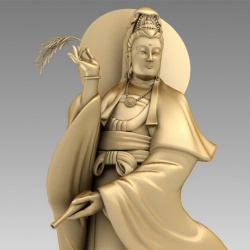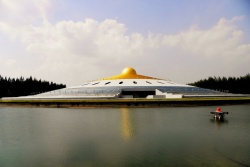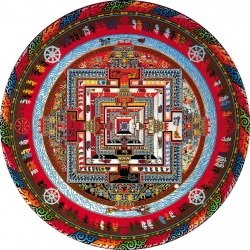The Saha World Is the Land of Eternally Tranquil Light
The Drama of Suffering Leads to Enlightenment
Each of us possesses infinite life force. We are individual "gold mines" with limitless resources embedded within our lives that need only be tapped. These stores of riches have always been there and are ours for the taking—if we use our Buddhist faith and practice to "mine" them. When times are good and we're riding high, this may make perfect sense. But what about when we're facing difficulties? When problems arise, do we remember our potential, our internal treasures?
The purpose of faith is to reveal that potential whether life gives us roses or thorns. It's during difficult times that our faith is tested. It is when we're facing seemingly colossal problems and feeling overwhelmed that it's most challenging to squarely face our hardships. Losing sight of our Buddhahood, we can start to unravel and begin to doubt ourselves. Or we sometimes give in to complaint and blame others or the environment for our problems. We long for a more carefree existence, a life without problems. We want to escape.
As Buddhists, we learn that amid the challenge of facing and overcoming our problems, while painful at the outset, exists the opportunity to tap our most precious resources that will eventually lead us to our greatest happiness. This chaotic world we live in is fertile earth for the revelation of our enlightenment. This concept in Buddhism is known as "the saha world is the Land of Eternally Tranquil Light."
The Sanskrit word saha means to endure. This endurance refers to a life filled with suffering that stems from greed, anger, foolishness and other earthly desires. The "Land of Eternally Tranquil Light" connotes the Buddha's land. The Buddha's enlightened wisdom is often compared to light. Together the phrases imply that the mundane world in which we live is, itself, the Buddha land.
According to the pre-Lotus Sutra scriptures, Shakyamuni taught that the world we live in was an impure land filled with suffering and earthly desires, completely separate from the Land of Eternally Tranquil Light in which Buddhas were said to have lived. There was no hope of attaining enlightenment unless we were reborn into a "pure land."
So why did Shakyamuni teach this? At the time, it was an expedient means or a way to arouse the seeking spirit of the believers who were interested only in secular desires.
In a world riddled with problems and earthly desires, is it really possible to ever become happy, let alone enlightened? How do we counteract our escapist tendencies?
Later in the "Life Span" chapter of the Lotus Sutra, Shakyamuni clearly refutes his previous teaching: "Ever since then I have been constantly in this saha world, preaching the Law, teaching and converting. And elsewhere I have led and benefited living beings in hundreds, thousands, ten thousands, millions of nayutas and asamkhyas of lands" (LS16, 225).
He clarifies that the saha world is where the Buddha preaches the Law to help people overcome their sufferings. Renouncing his princely status, Shakyamuni spent his entire life traveling throughout India talking with people and sharing his enlightenment.
Similarly, Nichiren Daishonin states in the "Record of the Orally Transmitted Teachings": "It is not the case that he [the practitioner of the Lotus Sutra) leaves his place and goes to some other place...Now the places where Nichiren and his followers chant Nam-myoho-renge-kyo, be they 'mountain valleys' or 'wilderness,' are all the Land of Eternally Tranquil Light" (Gosho Zenshu, p. 781).
Here the Daishonin teaches that in order to attain enlightenment, rather than seek fulfillment in some other realm, we chant Nam-myoho-renge-kyo where we are and make that place the Buddha land. As we each grapple with our reality, "the saha world thereupon immediately changed into a place of cleanness and purity" (LS11, 173).
In spite of numerous death threats, nearly being beheaded and exiled, Nichiren Daishonin tirelessly devoted his life to the cause of human happiness. He revealed the Mystic Law as the way all people could also become enlightened, and one by one encouraged his disciples through letters, leaving behind his written teachings for all generations to come.
In prison, second Soka Gakkai president Josei Toda thoroughly studied the Lotus Sutra as well as Nichiren Daishonin's teachings and chanted Nam-myoho-renge-kyo. Prison was where he attained enlightenment, making his place of confinement the Land of Eternally Tranquil Light. When he was released, he spent the rest of his life teaching others how to apply Buddhism to overcoming their problems in daily life.
Josei Toda wrote the following poem in prison:
My master left this world,
offering his life like Yakuo
How can I who remain
serve the Buddha's will?
All that is left to me
—the pure flower of life itself—
I will break from its stalk in offering
to repay my country and my friends.
(The Human Revolution, vol. 1, p. 160)
Shakyamuni and Nichiren Daishonin—and in fact, the three founding Soka Gakkai presidents Tsunesaburo Makiguchi, Josei Toda and Daisaku Ikeda—have shown how ordinary human beings can transform their sufferings into joy. And by remaining in this world and "preaching the Law" they helped other people find happiness. They did not shrink from their sufferings. Instead, they recognized their difficulties as the means to prove the existence of the Law of Nam-myoho-renge-kyo. As SGI members and Bodhisattvas of the Earth we have the same potential and many have and still are brilliantly transforming their lives. Winning over our problems is the way to prove the power of our Buddhist practice to our friends and families and all suffering people.
SGI President Ikeda often reminds us that we are enacting a great drama on the stage of kosen-rufu. He quotes his mentor: "President Toda often said: 'Someone who is too exemplary from the outset cannot go among the people. To spread Buddhism, we intentionally chose to be born as people who are poor or sick.' 'Life is like appearing in a play,' he would say" (The Wisdom of the Lotus Sutra, vol. 2, p. 208).
No matter what struggles we are currently enduring, the key is to face them with a positive attitude and confidence that they are part of our "drama for kosen-rufu." Since we can never divorce ourselves from this suffering world, no matter how hard we try, why not stop suffering as "escape artists" and become the protagonists in our personal dramas? As we learn to transform the reality of suffering with a sense of purpose, we can also develop a tremendous sense of freedom and power in that we are in control of how we act in relation to our environment. In doing so, we develop total fulfillment because everything is a source of growth. It is not a relative happiness, but a long-lasting one that emerges from the deeper regions of the self through faith. It is not dependent on one's external circumstances or environment.
As we go about our everyday business in the saha world, our Buddhist practice of chanting Nam-myoho-renge-kyo and helping others is the way to enlightenment. And no matter how difficult our lives may become or painful our experiences in the world around us, we challenge our difficulties with the determination to turn our lives and society into the "Land of Eternally Tranquil Light."




